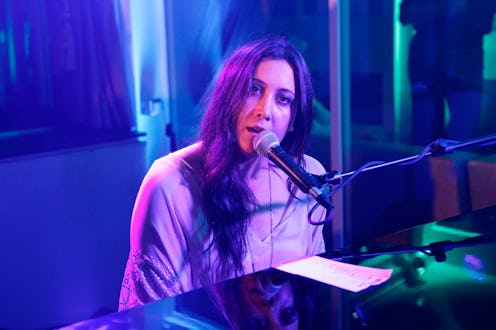Entertainment
Weird Reasons Songs Were Censored Or Banned
Music is an art form, and, as with any free expression, it often leads to controversy — and I'm not just talking about feuding boy bands. Though many of us might be accustomed to hearing plenty of risqué tracks on the radio, there are still plenty of songs that were banned from television, radio, stores, and even countries because the lyrics were deemed "too controversial." And no, it's not because all of these songs were filled with derogatory lyrics or offensive language — in fact, many of them don't feature any curse words at all: Some songs were banned or censored because of their political or social message (free speech, anyone?), references to sex or drugs, or overall "vibe" of the tune. These tunes aren't all oldies, either — some of them were banned in an era that's supposed to be accepting of different ideas. Yikes.
Some of the reasons why these tracks were banned will make you roll your eyes, while others might actually get you pretty mad about the occasional lack of freedom of expression in the music industry.
Check out these songs that were once called to be banned or censored for completely ridiculous reasons:
"White Houses," Vanessa Carlton (2004)
The music video for Carlton's tune was banned from MTV because of a vague line which describes the subject of the song losing her virginity. Perhaps the lyrics, "my first time/ hard to explain/ rush of blood/ and a little bit of pain" weren't quite "sexy" enough for MTV at the time, which seemed far more comfortable with Kelis' "Milkshake" bringing all the boys to the yard when "White Houses" was released. Carlton called out MTV for sexism in her 2007 interview with Slate, because, umm, duh.
"Puff The Magic Dragon," Peter, Paul And Mary (1962)
Though the composer insists that "Puff The Magic Dragon" isn't about marijuana, it didn't stop then Vice President Spiro Agnew from declaring it pro-drugs, and calling for a ban of the tune.
"I Can't Get No Satisfaction," The Rolling Stones (1965)
According to CBS, the iconic rock tune was taken off some radio stations due to the "aggressively sexual" nature of the song and "tasteless themes," which is particularly ridiculous because the song never actually references sex. (It's worth noting, the song was later covered by Britney Spears.)
"God Save The Queen," The Sex Pistols (1977)
The punk band probably wanted to incite controversy with their song, which aimed to spark a discussion about the monarchy in the UK. The BBC didn't dig the anti-establishment tune, though, and banned it from their stations.
"Radio, Radio," Elvis Costello (1977)
It was actually Saturday Night Live who did the banning in this case. According to Rolling Stone, Costello appeared on the show and was told to play his single "Less Than Zero," but instead stopped the song midway through and performed "Radio, Radio" instead, a song that criticized corporate-controlled broadcasting. SNL creator Lorne Michaels, who did not want "Radio, Radio" on the sketch show, reportedly banned Costello from the show for 12 years following the stunt.
"Judas," Lady Gaga (2011)
Lady Gaga's religious imagery in her song "Judas" didn't sit well with some listeners — or one entire country. According to EW, Lebanon banned her entire Born This Way album for what they called it's "blasphemous" nature.
"Love Is A Good Thing," Sheryl Crow (1996)
According to E! Online, this song actually caused Wal-Mart to ban Crow's self-titled album — specifically one line in the song, which referenced children killing each other with guns purchased at Wal-Mart. At the time, Wal-Mart had already fought several lawsuits over their sale of guns, and didn't approve of what a spokesperson called an "irresponsible" message.
